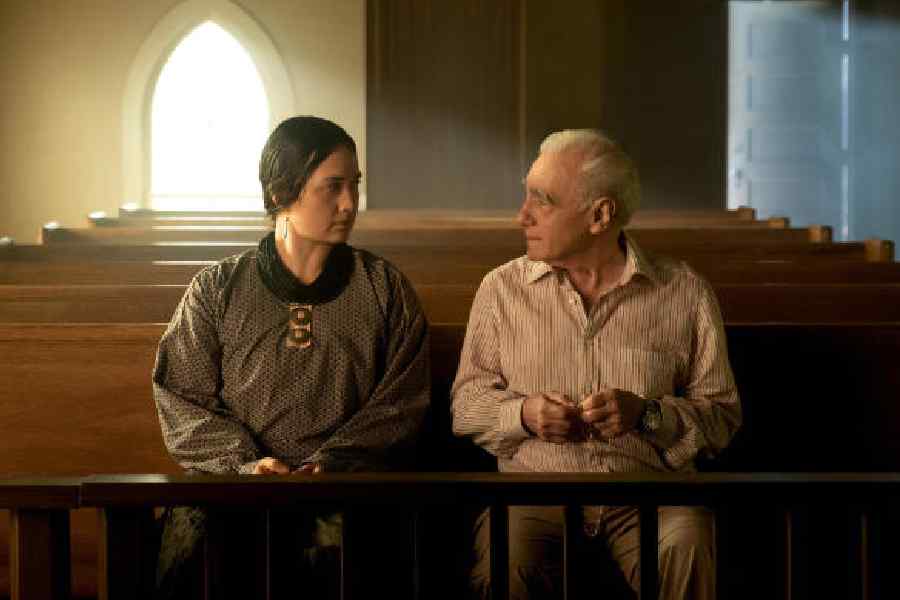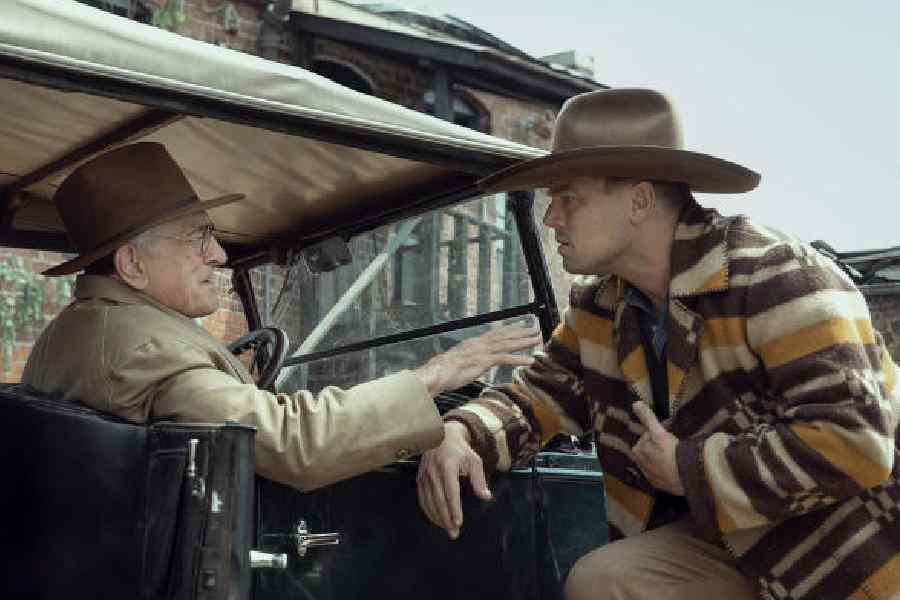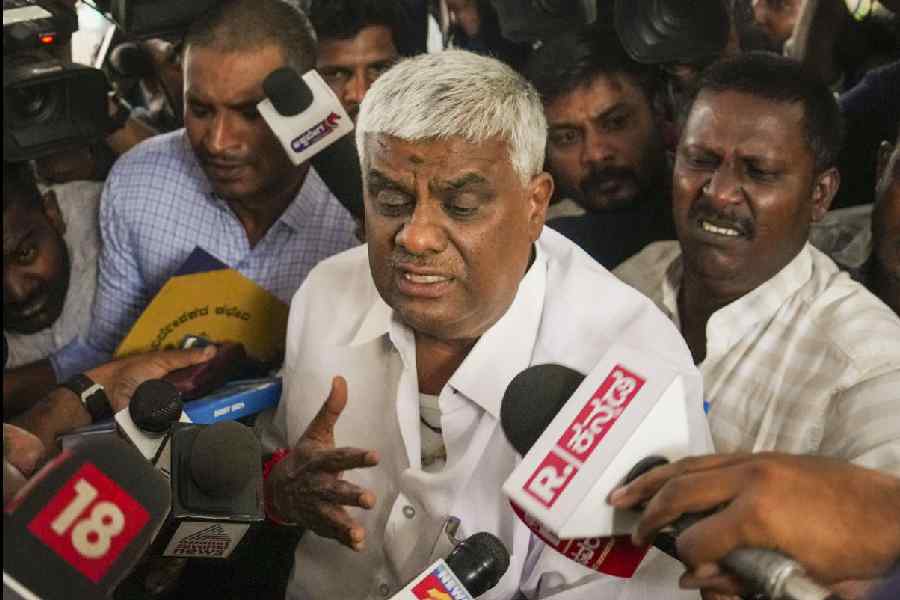When Martin Scorsese speaks, he makes people feel that the conversation has been going on forever and you know him well. That was exactly the case when he sat down with t2 and a select group of journalists from around the world to talk about his latest, Killers of the Flower Moon, an Apple Originals film, which is scheduled for a theatrical release and in the future, it will be available on Apple TV+.
Making Killers of the Flower Moon a complicated affair is the backdrop of the Osage murders of the early 1920s. Based on David Grann’s book, it’s a macabre tale of serial killings as well as love. The Osage tribe became wealthy after their land in Oklahoma turned out to be rich in oil. There was a problem: To claim income from it, Osage individuals needed a white co-signatory. At the same time, Mollie Burkhart (played by Lily Gladstone) and her family are disturbed by mysterious illnesses which have been killing off Osage people. Enter the slippery and ambitious Ernest Burkhart (played by Leonardo DiCaprio), who has returned to the US after service in World War I, to work for his uncle, William King Hale (played by Robert De Niro), who likes to believe that he knows the people of Oklahoma well.
Scorsese’s camera captures stories of love, betrayal and murder without diluting the truth or diving into a bagful of clichés. Here’s what the legendary director has to say.
What steps did you or the production team take to ensure that the Osage community felt accurately represented?
It was very important for me. As soon as I saw the book, I said: ‘Well, if you want me to be involved with anything that has to do with indigenous people and Native Americans….’ I had an experience in the ’70s when I began to become aware of the nature of what their situation was and still is. I was too young. I didn’t know. And it’s taken me years. I’m fascinated by how you deal with that culture in a way that is respectful and also is not hagiographic. How truthful can we be and still have authenticity, respect, dignity, and deal with the truth honestly as best we could?
Ultimately, we were dealing with a script on the basis of David Grann’s book, which is excellent. But the David Grann book also has the subtitle ‘The birth of the FBI’. For about a year and a half to two years, I was doing Irishman. Eric Roth (screenwriter) and I felt that we took the story of the birth of the FBI as far as we could take it. I wanted to keep balancing with the Osage. It was getting bigger, and bigger, and more diffused.
We went to Oklahoma and met with the Osage. And it was very different than what I had expected. They were naturally cautious. I had to explain to them, and I’m just going to try and deal with them as honestly and truthfully as possible. We weren’t going to fall into the trap (of clichés). What I didn’t really understand in the first couple of meetings was that this is an ongoing situation, an ongoing story out in Oklahoma.
In other words, these are things that really weren’t talked about (all the time) in the generation I was talking to. It was the generation before them that this happened to. So, they didn’t talk about it much. And the families are still there, the descendants are still there. What I learned from meeting with them, having dinners with them… Margie Burkhart (Mollie’s granddaughter)… she and a number of other people pointed out that you have to understand… a lot of the white guys there, particularly Bill Hale (William King Hale), they had good friends. One guy pointed out that Henry Roan was his (William’s) friend, and yet he killed him. And people just didn’t believe at the time that Bill would be capable of such things. What is that about us as human beings that allows for us to be so compartmentalised?
Margie said one has to remember that there was also love involved. Ultimately, the script shifted that way. That’s when Leo decided to play Ernest instead of Tom White (a BOI agent investigating the murders; the FBI was established as the Bureau of Investigation).
When was the first time you visited Oklahoma and what was your impression?
I think the first time was in 2019. It’s a little confusing because I was shooting The Irishman, doing the CGI on The Irishman, which had a longer post-production: four-five months. And then Covid hit. We were there before Covid. We took at least two trips there before Covid.
I am a New Yorker. I grew up in the Lower Eastside of New York. I’m very urban. I don’t understand weather that much, or where the sun is when you’re on the set. I was driving down Sunset Boulevard one time about 30 years ago, and I saw the sun setting. And I said: “That’s great. It’s Sunset Boulevard. The sun sets in the west. Now I get it.” Anyway, when I got there, all I can tell you is that those prairies are quite something. They open your mind and your heart, especially, driving on those roads through a prairie and on both sides are wild horses, and bison, and cows. I said: “Where do I put the camera at this point? How much of the sky? How much of the prairie?”
Then I began to realise that the land itself could be sinister. In other words, you’re a in a place like this, and you don’t see people for miles? You can do anything, particularly a hundred years ago. For me, 1920 is like ‘50 years ago’ because I was born in ’42, so the 1920s are the way ’90s are now to younger people. When they told me: ‘Marty, this is 100 years ago,’ I kept thinking: ‘What? Are we making a period piece?’
We went with the story of Mollie and Ernest because that’s the basis of love. Love is the basis of trust. So, when there’s a betrayal that way and that deep… here’s our story.
You’ve formed a 20-year partnership with Leonardo DiCaprio, and a 50-year partnership with Robert De Niro. Why do you return to them both so often and what has stood out to you most about their work on Killers of the Flower Moon?

Lily Gladstone with Martin Scorcese, the director of Killers of the Flower Moon Picture: Apple
In the case of Robert De Niro, we were teenagers together, and he’s the only one who really knows where I come from, the people I knew, and that sort of thing. Some of them are still alive. He knows them. I know his friends, his old friends, and we had a real testing ground in the ’70s where we tried everything and we found that we trusted each other. It’s all about trust and love. It’s what it is. And that’s a big deal, because often if an actor has a lot of power — and he had a lot of power — an actor could take over your picture. Studio gets angry with you, and the actor comes in and takes over. With him, I never felt that.
There was freedom, there was experimenting, and also not afraid of anything. And years later, he told me he worked with this kid, Leo DiCaprio, a little boy, in This Boy’s Life, and he said: ‘You should work with this kid some time.’ It was just casual. But within a line, something like that, a recommendation at that time, I think in the early ’90s, is not casual.
He says it casually, but he rarely gives recommendations. Years go by, and I’m presented with Leo, with Gangs of New York. He loved the pictures I’ve made, and he wanted to explore the same territory. And so we developed more of a relationship when we did The Aviator. And towards the end of it, there was a kind of something happening, a maturity in him… not quite sure, but we really clicked in certain scenes.
And that led to The Departed, and then (we) became much closer. We really found out that even though there’s some 30 years difference (between the two), he has similar sensibilities. He’ll come to me and say, ‘Listen to this record,’ and it’s Louis Jordan and Ella Fitzgerald. I grew up with it. He’s not bringing me anything new, but he likes it. He’ll call me and say, ‘You know, I had a cold and I was looking at Criterion films… I wanted to catch up on some of these classics, and I saw this incredible movie called Tokyo Story. Did you ever see it?’ This was last year.
What’s the combination you prefer: Scorsese-Leonardo DiCaprio or Scorsese-Robert De Niro?
Tell t2@abp.in










